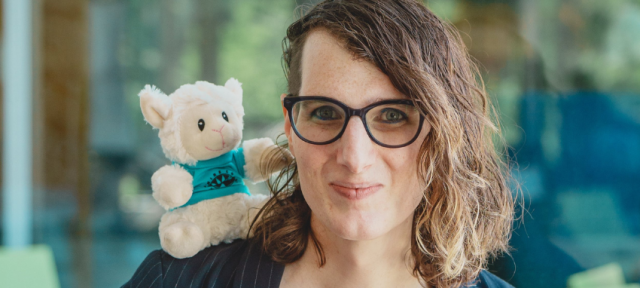Introducing Assistant Professor of Environmental Microbiology and Bioremediation Juliet Johnston

Hampshire College is pleased to welcome a number of exciting new professors to campus to support its fall class.
Before joining the faculty at Hampshire, Juliet Johnston taught environmental biological principles at the University of California Berkeley and the University of St. Thomas. She also completed two postdocs, one at Lawrence Livermore National Laboratory and the other at the Georgia Institute of Technology.
Johnston has an A.A. from Hillsborough Community College, a B.S. in environmental engineering with a minor in women’s and gender studies from Clemson University, and a Ph.D. in environmental engineering from the University of Minnesota. She is also the creator and founder of Queer Science, an outreach program she started while at the University of Minnesota to introduce LGBTQ+ high school students to LGBTQ+ scientists.
What are you passionate about when it comes to this work?
I love studying how microbial communities can be leveraged to perform bioremediation and biodegradation. Wastewater treatment is always fascinating as a highly complex microbial community chaotically assembles to clean numerous contaminants. I also enjoy writing to enhance social equity, especially for the LGBTQ+ community in STEM. Here are some examples of my research work:
- Metatranscriptomic Analysis Reveals Synergistic Activities of Comammox and Anammox Bacteria in Full-Scale Attached Growth Nitrogen Removal System | Environmental Science & Technology (acs.org)
- Ammonia-Oxidizing Bacteria Maintain Abundance but Lower amoA-Gene Expression during Cold Temperature Nitrification Failure in a Full-Scale Municipal Wastewater Treatment Plant | Microbiology Spectrum (asm.org)
- Building a queer- and trans-inclusive microbiology conference | mSystems (asm.org)
What are you looking forward to at Hampshire?
Community and exploring new approaches to STEM education. I’m so excited to be joining a smaller institution where I can really engage with the community and become a part of it. I’m particularly excited about the freedom and flexibility in the classroom to help test, build, and design new educational techniques.
How do you hope to engage with our new curricular model?
My research is directly tied to the Environments and Change Learning Collaborative, as climate change will directly impact which microbial communities thrive and how they will change.
In the classroom, I love providing space for dialogue and discussion around how engineering decisions, even tiny microbially related decisions, impact society and can bridge or further propagate social in/justice.
Anything else you’d like people at Hampshire to know about you?
While I love my current research and directions, I’m excited to see where this community leads me next.
Read more about Johnston in The American Society for Microbiology.



